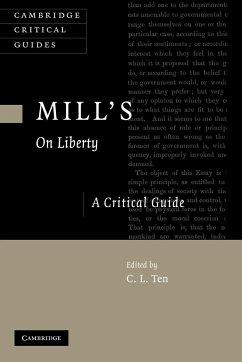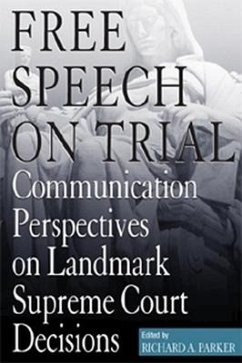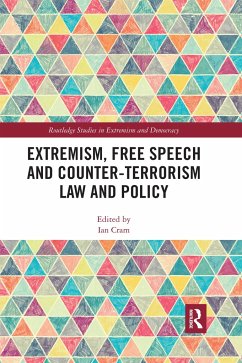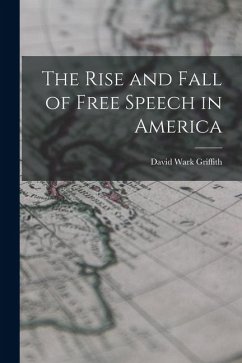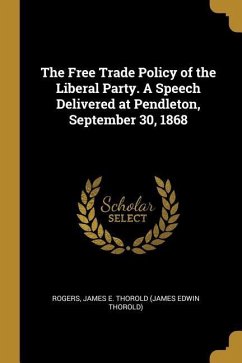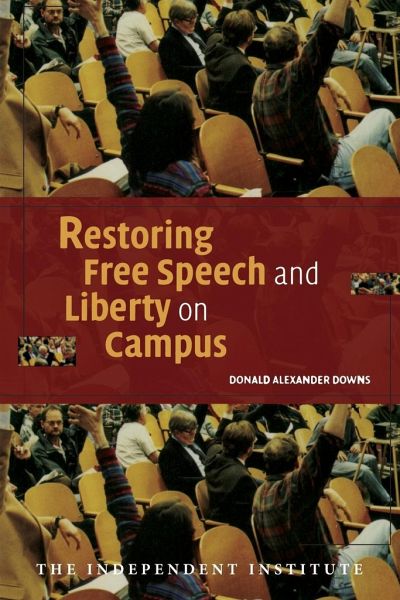
Restoring Free Speech and Liberty on Campus
Versandkostenfrei!
Versandfertig in 1-2 Wochen
39,99 €
inkl. MwSt.
Weitere Ausgaben:

PAYBACK Punkte
20 °P sammeln!
The decline of respect for free speech, academic freedom, and civil liberty in American universities.This book addresses a major problem in contemporary American higher education: deprivations of free speech, due process, and other basic civil liberties in the name of favored political causes. Downs begins by analyzing the nature and evolution of the problem, and discusses how these betrayals of liberty have harmed the truth seeking mission of universities. Rather than promoting equal respect and tolerance of diversity, policies restricting academic freedom and civil liberty have proved divisi...
The decline of respect for free speech, academic freedom, and civil liberty in American universities.
This book addresses a major problem in contemporary American higher education: deprivations of free speech, due process, and other basic civil liberties in the name of favored political causes. Downs begins by analyzing the nature and evolution of the problem, and discusses how these betrayals of liberty have harmed the truth seeking mission of universities. Rather than promoting equal respect and tolerance of diversity, policies restricting academic freedom and civil liberty have proved divisive, and have compromised the robust exchange of ideas that is a necessary condition of a meaningful education. Drawing on personal experience as well as research, Downs presents four case studies that illustrate the difference that conscientious political resistance and mobilization of faculty and students can make. Such movements have brought about unexpected success in renewing the principles of free speech, academic freedom, and civil liberty at universities where they have been active.
Review quote:
"This book is extremely well written and includes an excellent index... A must-read for anyone concerned about freedom of academic inquiry."
Choice
"[This book] offers a vivid, updated history of America's culture wars into the early 2000s, a real blow by blow account of the struggles over free speech and related issues; all from the perspective of a professor of political science, law, and journalism who was personally involved as a leader of a free speech movement of students and faculty at the University of Wisconsin, Madison. In this respect the book goes well beyond a theoretical exposition into an actual political narrative by a participant of the way mobilization was used to restore liberties that had been lost through the use of such policies as speech codes and anti-harassment codes."
Canadian Journal of Sociology Online
"An important contribution to the never-ending real-world struggles to maintain free speech on campus. Should be read by anyone interested in the status of higher education, the fate of constitutional citizenship, [and] the politics of civil liberty."
Nadine Strossen, President, American Civil Liberties Union
"At the very core of all our rights and liberties is the First Amendment. One of the places it has been most endangered is the American college and university campus. The story of how Donald Downs restored it so vibrantly against considerable odds is downright inspiring and, I hope, infectious."
Nat Hentoff, Author and Columnist, The Village Voice
"Puts coercive political correctness under the microscope as no previous book has done, and discovers not only why it is virulent but how to make antibodies. Real intellectual diversity-and thus the American university itself-has no better friend, anywhere, than Donald Downs."
Jonathan Rauch, Columnist, Atlantic Monthly
"Restoring Free Speech and Liberty on Campus, the product of considerable scholarship, is unequivocal in the positions it holds. Most of all, it is thought provoking and challenging. Agreement with all of Down's conclusions is neither important nor necessary, but this book needs to be read, discussed, and debated and, as a profession we need to be mindful of his perspective. It is a book that should find its way on the reading lists of those who in any way are engaged in the political, cultural, and social issues that so often frame campus life."
Journal of College Student Development
Table of contents:
Part I. Introduction and Background: 1. The return of the proprietary university and the new politics of free speech and civil liberty; 2. Background: the rise of anti-free speech and liberty ideologies; Part II. Case Studies in the Politics of Civil Liberty on Campus: 3. Columbia's sexual misconduct policy: civil liberty vs. solidarity; 4. Berkeley and the rise of the anti-free speech movement; 5. Undue process at Penn; 6. Renewal: the rise of the free speech movement at Wisconsin; 7. Abolition in the Wisconsin faculty senate and its aftermath; 8. Some conclusions concerning civil liberty and political strategy.
This book addresses a major problem in contemporary American higher education: deprivations of free speech, due process, and other basic civil liberties in the name of favored political causes. Downs begins by analyzing the nature and evolution of the problem, and discusses how these betrayals of liberty have harmed the truth seeking mission of universities. Rather than promoting equal respect and tolerance of diversity, policies restricting academic freedom and civil liberty have proved divisive, and have compromised the robust exchange of ideas that is a necessary condition of a meaningful education. Drawing on personal experience as well as research, Downs presents four case studies that illustrate the difference that conscientious political resistance and mobilization of faculty and students can make. Such movements have brought about unexpected success in renewing the principles of free speech, academic freedom, and civil liberty at universities where they have been active.
Review quote:
"This book is extremely well written and includes an excellent index... A must-read for anyone concerned about freedom of academic inquiry."
Choice
"[This book] offers a vivid, updated history of America's culture wars into the early 2000s, a real blow by blow account of the struggles over free speech and related issues; all from the perspective of a professor of political science, law, and journalism who was personally involved as a leader of a free speech movement of students and faculty at the University of Wisconsin, Madison. In this respect the book goes well beyond a theoretical exposition into an actual political narrative by a participant of the way mobilization was used to restore liberties that had been lost through the use of such policies as speech codes and anti-harassment codes."
Canadian Journal of Sociology Online
"An important contribution to the never-ending real-world struggles to maintain free speech on campus. Should be read by anyone interested in the status of higher education, the fate of constitutional citizenship, [and] the politics of civil liberty."
Nadine Strossen, President, American Civil Liberties Union
"At the very core of all our rights and liberties is the First Amendment. One of the places it has been most endangered is the American college and university campus. The story of how Donald Downs restored it so vibrantly against considerable odds is downright inspiring and, I hope, infectious."
Nat Hentoff, Author and Columnist, The Village Voice
"Puts coercive political correctness under the microscope as no previous book has done, and discovers not only why it is virulent but how to make antibodies. Real intellectual diversity-and thus the American university itself-has no better friend, anywhere, than Donald Downs."
Jonathan Rauch, Columnist, Atlantic Monthly
"Restoring Free Speech and Liberty on Campus, the product of considerable scholarship, is unequivocal in the positions it holds. Most of all, it is thought provoking and challenging. Agreement with all of Down's conclusions is neither important nor necessary, but this book needs to be read, discussed, and debated and, as a profession we need to be mindful of his perspective. It is a book that should find its way on the reading lists of those who in any way are engaged in the political, cultural, and social issues that so often frame campus life."
Journal of College Student Development
Table of contents:
Part I. Introduction and Background: 1. The return of the proprietary university and the new politics of free speech and civil liberty; 2. Background: the rise of anti-free speech and liberty ideologies; Part II. Case Studies in the Politics of Civil Liberty on Campus: 3. Columbia's sexual misconduct policy: civil liberty vs. solidarity; 4. Berkeley and the rise of the anti-free speech movement; 5. Undue process at Penn; 6. Renewal: the rise of the free speech movement at Wisconsin; 7. Abolition in the Wisconsin faculty senate and its aftermath; 8. Some conclusions concerning civil liberty and political strategy.







